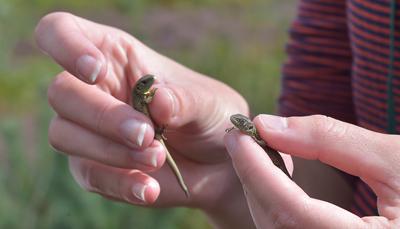Lizard release brings rare species back to its natural habitat in Britain

A PhD researcher from the University of Southampton will closely monitor a population of rare lizards recently released back into the wild.
As part of efforts to restore Britain’s biodiversity, Marwell Wildlife has released 80 juvenile sand lizards onto Eelmoor Marsh Site of Special Scientific Interest, near Farnborough.
This is the first stage in a three-year release plan, which will see the Hampshire conservation charity restore the animals to their natural habitat and historic range, as part of the sand lizard reintroduction strategy.
The lizard population will be closely monitored after their release by Marwell Wildlife and University of Southampton PhD researcher in Biological Sciences, Rachel Gardner, who is working hard to continually assess the existing reptile community on site and the habitat suitability.
Rachel hopes the exercise will not only offer the opportunity to return the species to its indigenous range but also help answer some key questions surrounding its dispersal, use of microhabitats and survivorship.
“As part of the close monitoring of the lizards after the release we hope to radio tag a portion of the population next year, in order to follow individuals more closely,” says Rachel. “In total we intend for 240 individuals to be released during this reintroduction programme to establish a self-sustaining population at the site indefinitely.”
Despite occurring widely across Europe and Asia, the sand lizard (Lacerta agilis) is threatened in the north western part of its range and had disappeared from much of its former habitat in England and Wales prior to concerted conservation efforts.
Marwell Conservation Biologist Dr Martin Wilkie said: “This is a rare opportunity to monitor this cryptic species after their release, to try to understand its habitat requirements and ability to survive. It will also be a chance to answer other fundamental questions around their ecology on a site that we are directly managing, which is very difficult elsewhere.”
The heathland site, owned by QinetiQ and managed by Marwell Wildlife, has been restored to favourable condition following more than 20 years of targeted habitat management. Dr Sam Healy, Group Corporate Responsibility Director at QinetiQ, said: “It is a privilege for QinetiQ to have this important conservation programme at Eelmoor Marsh on our Farnborough site. We are delighted that sand lizards are being released.”
The release comes in the year in which Marwell and partners celebrate a quarter of a century of successful sand lizard reintroductions. Over the past 25 years Marwell Wildlife, in conjunction with the Amphibian & Reptile Conservation (ARC) Trust and Natural England, has reported on the successful outcome of releasing captive bred lizards on heathland and coastal dune sites. Nearly 2,000 juvenile sand lizards have been reintroduced to their indigenous habitats over the duration of the project, with a number of populations now surviving for over two decades since the founder animals were released.
Natural England's reptile specialist, Paul Edgar, said: “I’ve seen this busy corner of the airfield at Farnborough being transformed over 25 years from a stand of dense pine and rhododendron to an oasis for rare heathland wildlife. The team at Marwell Zoo have created the perfect conditions for wildlife to survive and thrive, with one of the final pieces of the jigsaw seeing rare sand lizards make a long overdue return to the Thames Basin Heaths in Hampshire.”
ARC’s Reptile Conservation Officer Nick Moulton added: “We are delighted to continue the captive breeding and reintroduction program with Marwell Wildlife. This successful partnership has now started its 27th sand lizard reintroduction. The site is excellent and we believe, as with the majority of our previous reintroductions, that the animals will do very well. We are delighted to continue our partnership with the University of Southampton, as Rachel’s post release monitoring will provide detailed research that will enhance our best practice guidance for this illusive animal.”